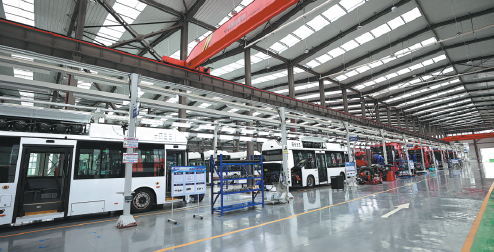Conference highlights vital role of private enterprises
Updated: 2023-07-14

Hydrogen-fueled vehicles are assembled at the production plant of Meijin Group in Taiyuan. [Photo by Hou Lijun for China Daily]
Event sees businesses awarded for contributions to development of Shanxi province
Contributions made by private enterprises to Taiyuan's development were praised by local authorities during a recent conference in the capital city of Shanxi province.
Nearly 1,000 representatives of companies, trade associations and household businesses attended the Taiyuan High-Quality Development Conference for the Private Economy held on June 30.
Nineteen enterprises were awarded as private businesses with outstanding contributions at the event. There were also awards for 160 excellent private businesses, 44 excellent entrepreneurs, 30 excellent household businesses and 10 excellent trade associations.
"This is the largest-scale event focusing on the private economy I have ever attended," said Chen Deping, general manager of Shanxi iFlytek Artificial Intelligence Technology.
The company was among the 160 excellent private companies recognized by the authorities of Taiyuan.
"We are glad to win the award," Chen said. "But we are even happier with the fact that a slew of new preferential policies were released by the Shanxi Committee of the Communist Party of China and the Shanxi provincial government, which will boost our confidence in future growth."
Authorities of Taiyuan announced a package of 26 incentive policies in eight categories that include further optimizing administrative services and protecting the interests of private businesses. This is the latest addition to the existing preferential policies issued by the central, provincial and city governments.
Taiyuan's private businesses saw their revival in the late 1970s when China's reform and opening-up initiatives began and have developed in a rapid and sustainable manner over the past decades.
Meijin Group based in Taiyuan, for instance, is a private company that has grown along with China's development over the decades.
The company was founded in 1981, with an initial investment of just 16,000 yuan ($2,232) borrowed from a local bank, according to Yao Junliang, board chairman of Meijin.
After it had grown into a major coal mining and coking enterprise in Taiyuan, Yao said it began to diversify into the hydrogen industry in 2017. In about six years, Meijin has developed into one of the major hydrogen producers and hydrogen energy solutions providers in Shanxi province.
Its product and service portfolio in the hydrogen industry now includes hydrogen, hydrogen-fueled vehicles, hydrogen storage and hydrogen filling stations.
Meijin's production plant for hydrogen-fueled vehicles began construction in September 2022. With a total investment of 1.8 billion yuan, the facility is capable of an annual output of 20,000 vehicles with a loading capacity of up to 49 metric tons.
The first phase of the plant is now operational, which can produce 5,000 hydrogen trucks a year and core components to match this capacity, according to Yao.
"The beneficial business environment in Taiyuan, as well as Shanxi province, which includes the authorities' emphasis on the private economy, the preferential policies and the governments' constant efforts to improve services for businesses, is one of the major driving forces for Meijin's growth," the executive said.
A winner of the excellent private business award, Jinbo Biology is another prime example of the successful development of private businesses in Taiyuan – not only in conventional industries but also in cutting-edge sectors.
Jinbo is the developer of recombined human-origin collagen III. It is a product at a globally advanced level, which can be used in different sectors ranging from surgery, gynecology and dermatology to skin care cosmetics, according to Yang Xia, founder and chairwoman of the company.
The executive said Jinbo Biology is one of the few enterprises in the world that mass produces the collagen. Its volume production began in January 2021.
When recalling Jinbo's growth over the years, Yang said she is grateful for the professional, considerate and highly efficient services provided by the local authorities.
She cited the government's supportive measures like assistance in fundraising, promoting collaborations between enterprises and research institutions, protecting intellectual property rights, and helping enterprises recruit research and development professionals.
Yang said the recent support from local authorities entailed the financial office of the Taiyuan city government helping the company in advancing procedures to go public on the domestic stock market. Its registration for initial public offering was approved by the China Securities Regulatory Commission on June 26.
Wang Guodong, an official in charge of industry and information technology at the Taiyuan committee of the Communist Party of China, made a detailed interpretation of the new preferential policies announced at the event.
He said the policies were mapped out as a result of the local officials' extensive and intensive research tours of local businesses. The focus of the tours was to identify the difficulties and challenges the private businesses faced, and to listen to their pressing concerns and demands relating to their development.
He especially noted that Wei Tao, secretary of the Taiyuan CPC committee, visited a great number of enterprises for the drafting of the preferential policies.
"One problem we noticed during the research tours was the complaint of delayed payment from institutional buyers," Wang said.
He explained that the governmental institutions are allocating more expenditure on buying products and services from private businesses to show their support. "Delay of payment could happen sometimes because of the complicated settlement procedures of institutions," Wang said.
To address this concern, the government has made it a rule that government procurement should be part of the administrative transparency initiative, allowing the procedures of transaction, implementation and payment to be supervised by the businesses and the public.
Other incentives for private companies are special funds to be established to spur their development. These include funds for industrial transformation, industrial digitalization and technological innovation.
Wang said it is noteworthy that there are specific funds for cultivating high-quality small and medium-sized enterprises, where private businesses are the mainstay.
For instance, Wang said SMEs that fall in the specialized, refined, differential and innovative categories or are defined as "little giants"-small enterprises that are still in the early stage of development and focus on new-generation information technology, high-end equipment manufacturing, new energy, new materials, biomedicine and other high-tech fields – can be awarded up to 3.3 million yuan annually according to their performance.
Thanks to Taiyuan's beneficial business environment, the city has witnessed a growing enthusiasm for entrepreneurship in the private sector in recent years.
Local statistics show that the number of private business entities in Taiyuan surpassed 763,000 in 2022, accounting for 99.1 percent of the city's total. These entities have created employment for 1.62 million people, representing 62.4 percent of Taiyuan's work population.
Yang Yu contributed to this story.



